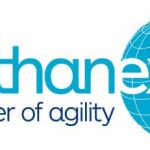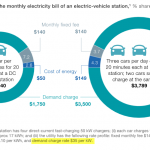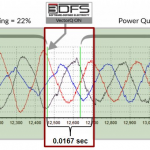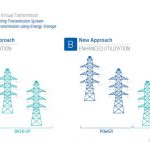General Electric: Seeking to Define the Smart Grid
By Harris Roen General Electric (GE) is a standout company that supplies products and services in the alternative energy and environmental fields. GE also has a robust stake in smart grid technology; its energy division alone has products that include power delivery, smart metering, charging systems, and power sensing. According to Cleantech, GE is a player in 5 of the 6 critical business areas affecting smart grid development. As part of their commitment to shape the future of the smart grid, GE committed $200 million for entrepreneurs, students and other innovators as a “call to action” for...
New Transmission Technologies
Tom Konrad, CFA Why wasn't Aluminum Conductor Composite Core (ACCC) technology mentioned in Colorado's REDI report? In December, I gave readers a brief summary and a few investing ideas based on Colorado's Renewable Energy Development Infrastructure (REDI) report. I've now read the entire report, much of which is focused on Colorado's needs in terms of electric infrastructure. In addition to some useful price data for long distance transmission, there was a short section on "the potential for new transmission technologies" (page 35.) The new technologies mentioned were Aluminum-conductor, steel-supported (ACSS) with ultra-high strength cores. Aluminum-conductor, composite reinforced (ACCR)...
Bargain Priced Alternative Energy Stocks
A review of Crystal Equity Research’s novel alternative energy indices found a number of companies that have delivered exceptional price appreciation over the last year. Several were reviewed in the recent post “Alternative Returns” on May 8th. Expectations for growth appeared to be driving the price movement, so the last post “Quest for Growth” featured four companies from the indices for which analysts have posted high growth predictions. Not unexpectedly some investors have already bid higher the stocks of those promising companies.
In this post we go back to the lists to find the companies with both high growth predictions and low price-earnings...
Feel-Good Government Grants Leading Cleantech Astray
David Gold Grants for smart grid projects. Grants for battery manufacturing lines. Loan guarantees for renewable energy project development. Grants to private companies for energy efficiency projects. And with each it seems that the cleantech world cheers. Yet for all our desire to create sustainability in our consumption and use of energy, this model of getting us there is not only unsustainable but is of questionable value. I want to emphasize that I am speaking about government grants to the private sector where the government is not the end customer and...
EV Fast Charging Disincentives
by Daryl Roberts
DC Fast Chargers (DCFCs) and Tesla superchargers are a key element in electric vehicle (EV) charging infrastructure that could facilitate wider adoption of EVs by enabling recharging that comes to resemble the time currently taken for gas station stops, and thereby reducing “range anxiety” for drivers.
However, the pricing structure for electrical costs incurred at commercial DC fast chargers is currently prohibitive, because it includes a special fee called a “demand charge”. Rate design in a number of states includes this additional charge, based on the “peak rate” on electric power consumed in kW. In New York,...
MasTec (MTZ): Connectivity to the Smart Grid
By Harris Roen An important part of the smart grid will be devices that connect the user to the grid, or “reading points”. These reading points go way beyond the current meter reading system that just monitor the amount of energy used. The long held belief that meter reading was the only way to monitor household and business’s consumption is quickly being replaced with alternate ideas. MasTec (MTZ) is a contracting firm with $2.1 billion in annual sales focused on utility and communications infrastructure. It specializes in communications, high-speed Internet and electric distribution, as well as...
Climate Change & Corporate Disclosure: Should Investors Care?
Charles Morand On Monday morning, I received an e-copy of a new research note by BofA Merrill Lynch arguing that disclosure by publicly-listed companies on the issue of climate change was becoming increasingly "important". The note claimed: "e believe smart investors and companies will recognize the edge they can gain by understanding low carbon trends." I couldn't agree more with that statement. It was no coincidence that on that same day the Carbon Disclosure Project (CDP), a non-profit UK-based organization that surveys public companies each year on the state of their climate change awareness, was...
Congress Approves Billions in Energy Storage Incentives
On Friday, the House of Representatives and Senate passed H.R. 1, the American Recovery and Reinvestment Act of 2009 and sent the bill to President Obama for his signature. The impact on companies that manufacture advanced batteries and other energy storage devices will be staggering. The principal energy storage appropriations include: $2,000,000,000 for grants to manufacturers of advanced battery systems and vehicle batteries that are produced in the United States, including advanced lithium ion batteries, hybrid electrical systems, component manufacturers, and software designers; $4,500,000,000 for grants for “Electricity Delivery and Energy Reliability” including activities to modernize the electric...
Energy Infrastructure Construction Made Easy
by Debra Fiakas CFA Electric power companies need plenty of generating plants and distribution works to bring electricity to our doors. Electric utilities are very good at generating electricity and managing relationships with the families and businesses that use the power, but building all that infrastructure - drawing up plans, hauling in materials and fastening girders - is not necessarily a power company’s strong suit. Enter Quanta, Inc. (PWR: NYSE) with a full menu of design, engineering and construction services for electricity generation and distribution infrastructure. Solving problems for electric utilities is good business for Quanta. The...
Digital Electrification: Less Waste, More Capacity
One potentially huge contributor to decarbonization of the economy could come from dramatic efficiency gains obtainable from digitally improving the power quality of electricity, as it is being generated, transmitted & being consumed. The enabling technology is emerging from developments in computing that is associated with the Internet of Things (IOT).
DOE estimates indicate that approximately 38.2 quads of electricity are produced, from all sources, but that 25.3 quads, or 66.2% is deemed “Rejected Energy”, so only 33.8% of generated electricity is actually being used. Within that 66% a distinction is recognized between “Losses” & “Waste”:
Loss is non-recoverable, I2R...
Grid-based Energy Storage: Widely Misunderstood Challenges and Opportunities
John Petersen The most widely misunderstood subject in the field of energy storage is the potential for grid-based applications. They fire the imagination because the grid is so pervasive and the need is so great. They also present immense challenges to storage technology developers because the fundamental economic value per unit of grid-based energy storage is very low. While the subject of grid-based storage provides rich fodder for media reports and political posturing, the reality bears little relation to the perception. On March 9th, Lux Research published a sorely needed reality check in a new report titled "Grid...
The Best Peak Oil Investments Meet the Smart Grid: Telvent GIT SA (TLVT)
Tom Konrad CFA I'm bullish on Smart Transportation, which is my term for applying information technology to make our transportation system more efficient. The majority of my list of Smart Transportation Stocks focus on GPS navigation. I've been a fan of GPS navigation ever since 2001, when I first experienced the relief using one while driving in an unfamiliar city. But I'm much less enthusiastic about GPS Navigation stocks: I feel the industry is too competitive, which is great for the consumer, but not so great for the shareholder. Hence, I'm drawn to the three Smart...
Energy Storage as Transmission Explained
by Blackridge Research
The latest trend is that power transmission companies around the world are increasingly looking at energy storage technology to defer or replace transmission system upgrades. How this works is energy storage is placed along a transmission line and operated to inject or absorb power, mimicking transmission line flows. Going with names like “virtual transmission” in Australia and “GridBooster” in Germany, projects totaling over 3 GW of capacity are poised to increase system efficiency and reliability across the world.
Storage as transmission offers an array of benefits over traditional transmission infrastructure. They are faster to deploy, have smaller footprint,...
Clean Energy Stocks Shopping List: Smart Grid and Strong Grid
My five favorite stocks with technology to improve grid reliability. Tom Konrad, Ph.D., CFA Although the market has risen above where it was in early June, when I said "We're near the top," I'm still bearish. And I'm still making lists of stocks to buy when prices seem more favorable. Previous articles in this Clean Energy Stocks Shopping List series are listed at the end of this one. The Strong Grid I recently wrote about our list of Smart Grid Stocks, and at least two readers were prompted to ask why wasn't (1) Beacon Power (BCON) on the...
Keynes Meets Carson, And How You Can Invest It (Part 1)
I'm not sure whether John Maynard Keynes, the father of Keynesian economics and an ardent proponent of government interventionism during hard economic times, and Rachel Carson, the mother of modern environmentalism and the author whose work is credited for the eventual creation of the EPA, ever met during their lifetimes. But if current voter sentiment holds until November 4, their ideas could soon converge and form the basis of government policy for at least the next four years. Let me explain. First, John Maynard Keynes. There is no doubt that the deliberate and coordinated nationalization of financial services...
The Value of Net Metered Electricity in New York
by Tom Konrad, Ph.D. Net metering is unfair and is dangerous for the long term health of utilities, at least according to Raymond Wuslich, when he spoke at the 2015 Renewable Energy Conference in Poughkeepsie, NY. Wustlich is an attorney and partner at Winston & Strawn, LLP., and advises clients across the electricity and natural gas industries on Federal Energy Regulatory Commission (FERC) matters. To make his point, Wuslich used a simplified New York residential electric bill. In this simplified bill, the customer was charged 12¢ per kWh for...






